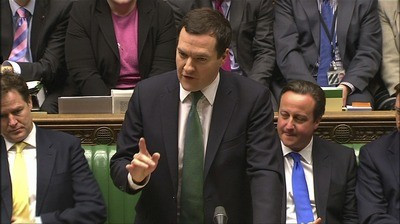Osborne Ruled with Austerity Statement Full of Promises - But Will Voters Swallow it?

This year's Autumn Statement was Chancellor George Osborne's big chance to finally challenge Labour and move the political debate back on to his own turf of a reviving economy and better times ahead. And he made the most of it.
It was, by any measure, an extraordinary statement from a chancellor who continues to preside over a deeply gloomy economy and profound fears over what the future truly holds for those famous "hardworking families" every politician now claims to speak for.
And his own party genuinely loved it. After his previous "omnishambles" budget and flagging personal ratings, he is back at the top of the government tree and, to quote one supporter "lord of all he surveys".
That may be over the top but his personal political fortunes have been transformed and he is firmly back in the running as the next leader of the party. At the moment.
And all this happened because of, not despite, the fact that he continued to push an austerity message, albeit one with a silver lining.
We were promised there would be no giveaways in the statement and both Osborne and the prime minister were already on record as saying that austerity was set to reign for years to come.
Both were underlined in the statement. The package was fiscally neutral, so no extra spending, and the forecasts were significantly better than before but still bad, even through the next election period.
And that is what made the statement so extraordinary because, however bad the news and however tough the next few years are set to be, Osborne appeared to pull it off. There were no real attempts to suggest good times were here, quite the opposite.
While there were no short term giveaways there were smaller measures to help businesses, drivers, the jobless, married couples and "hardworking families". But nothing major.
The big stuff was all based on OBR forecasts, still way below those made in 2010 but much better than last year, predicting that after another four years Britain will be running a budget surplus - the sunny uplands beckoning.
Most of what was in the package was heavily briefed beforehand, partly to take the sting out of the tougher measures such as increasing the pension age and cutting welfare and government spending, but also to allow Osborne to concentrate on his core message. And that was a hugely political message.
It amounted to the predictable, contestable but none the less potent claim that Labour got the country into the mess, subsequently recommended the wrong remedies and now continue to suggest medicine that would make the condition worse.
The coalition government, and Osborne in particular, called it right, stuck to their guns and got the economy into a position where the recovery would embed further, families would be protected and, ultimately, there would be good times under a government running that budget surplus.
Or, in Osborne's words: "Britain's economic plan is working but the job is not done." Labour and its calls for a plan B had been "proved comprehensively wrong. We have held our nerve".
The great danger for Osborne and the government, however, is that previous forecasts, as he showed, have proved hugely wide of the mark. They have been in his favour this time, but that may not always be the case and may be decided by events beyond his control.
But more worryingly is the fact that, commanding though this performance was, its long term success relies entirely on voters believing it all and accepting the harsh realities of years' more pain before they reap the promised big rewards.
Shadow Chancel Ed Balls' economic strategy has been hugely undermined, which is why he and Ed Miliband have switched their line of attack onto the "cost of living crisis", but that has proved fertile territory for the opposition so far.
Osborne has a real challenge persuading people to lift their sights to more long term sunshine when they are struggling to get through each day. The way people feel about their subjective circumstances could very easily trump politicians' promises. That is precisely what the cost of living crisis has beaten the sound economy argument.
As one Labour MP said: "Give it a few weeks and, in the New Year, we will be back to business as usual".
© Copyright IBTimes 2025. All rights reserved.






















